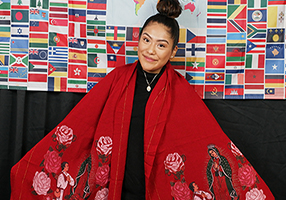
MANHATTAN — Twenty-year-old Abigail Zarate is a Latino Studies student at John Jay College of Criminal Justice, a Mexican-American, a Catholic, and a first-time voter. For some, this might sound like a lot, but for her, being many things at once is part of her cultural identity and faith journey.
“Even though I was born in the U.S., I still carry on the traditions and the culture,” she explained of her Mexican heritage. “My parents speak the dialect, and being able to listen and still grasp the roots of a dialect that’s being lost in Mexico right now, is amazing to me. I’m able to carry on small parts of the roots that my parents brought to this country.”
Not just the dialect Zarate’s family speaks, but the food that they eat, the community they build, and the customs they follow reflect an experience that is found in many Latino cultures: that of the Diaspora.
“The Diaspora originally was the spread of Catholicism, which was a colonizing force by the Spanish throughout Latin America,” explains Dr. Steven Alvarez, an associate English professor at St. John’s University.
“Catholicism has a long history in Mexico, partly of subjugation, but then partly also of creating a different kind of Catholicism,” explained Alvarez, who specializes in literacy studies with a focus on Mexican immigrant communities.
“With Mexican Catholicism, you see a synergy of the indigenous, but also with the European because that’s what Mexicans are,” he said. “We’re ‘mestizos,’ we’re a mixture.”
“When Mexicans start migrating northward into the U.S., of course, you bring a religion,” Alvarez said, “and the religion is also a way to build community, particularly ways to face discrimination and racism, and other forms of inequities.”
For Mexicans of faith, churches can be the building blocks for solidarity, community, and even activism. “They would be thinking about social justice issues, brought together by their faith,” especially those who moved farther north to New York City, he added.
Often, migrants would look to churches to get support for their children and access to resources to learn about schools, “and to whatever challenges they were facing, no doubt it was their faith, that for a lot of that, was going to lead them through and to build community in this way,” he said.
Additionally, “the Mexican community is not monolithic,” Alvarez explains, “so there are class distinctions that must be pointed out…the people who are undocumented…people who may have no trouble getting a visa and going back and forth.”
That being said, the impact of national politics on Mexican Catholics is complicated — for several reasons.
“Latinos, in general, have been disappointed by both parties, and have been put in the middle of both parties and been kicked around by both parties,” Alvarez told The Tablet.
He wonders if, between presidential candidates Donald Trump and Joe Biden, the Mexican-American community is seeing a political change in representation on a national level.
But then you are seeing Mexican people who are in city councils, and school boards pay attention at the local levels,” something that is happening right now in New York City.
César Zúñiga, who is Mexican-American, is currently running for the District 38 New York City Council seat in next year’s election.
“My parents’ Catholicism was a very important part of their identity, and I think the values of the Catholic religion are still values that I espouse,” Zúñiga, a Democrat, told The Tablet.
“It’s family values,” added Ely Soriano, Zúñiga’s cousin, who is very active in the Mexican Apostolate in the Diocese of Brooklyn.
“If you lose those family values, then you get away from who we are. And then you get lost in this world,” he said.
Currently, 81% of Mexicans living in Mexico identify as Catholic, versus 61% of Mexicans or Mexican-Americans living in the U.S., according to Pew Research Center.
Zúñiga was raised knowing a Jesus who was “about providing a safety net, redemption to people who may not do the right things sometimes,” he explained, which has led him to advocate for affordable housing and childcare for members of his community.
But Soriano is concerned that the impact of the diasporic Mexican experience may cause younger generations to lack faith formation.
“The younger generations, they can still call themselves Catholics because of this lack of faith formation, and they don’t live their life as Catholics,” argues Soriano.
Being able to connect with other people in faith is important to Zarate, who is a parishioner of Incarnation Church in Queens Village, and a member of the Jornada movement.
“There’s never an opportunity that should be missed,” she said. “There’s always a chance of learning something that you didn’t know before about your faith. There’s more to it.”
A lack in this faith-based guidance, Soriano believes, could pose a challenge when it comes to politics and voting.
Biden, who is Catholic, is pro-abortion, and the Trump administration’s response towards issues of concern to Hispanic communities — like immigration and the coronavirus pandemic — have been “less than Catholic,” Soriano argues.
To date, Hispanics have been impacted by the coronavirus more than any other group in the U.S., especially those living in Brooklyn and Queens.
Soriano was close to Father Jorge Ortiz-Garay, former leader of the Mexican Apostolate and the first U.S. priest to die from the coronavirus. “He would probably be alive and a lot of people that we know, that you know, would probably be with us today,” he said.
But due to what Soriano says is the government’s delay in an appropriate response, “he is no longer with us. And many, many, many lives are gone … I think a lot of people are going to reflect on those two points” of immigration and the coronavirus.
“I think about the bigger picture,” added Zarate. “I think of not just decisions that benefit me in particular, but decisions that will benefit people in my community, people who are not a part of my community.”
